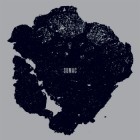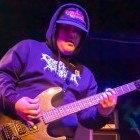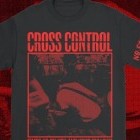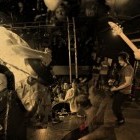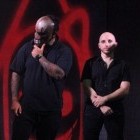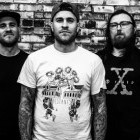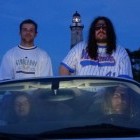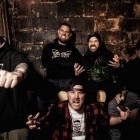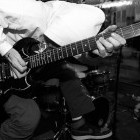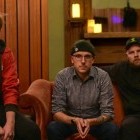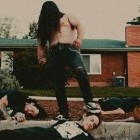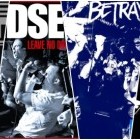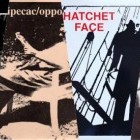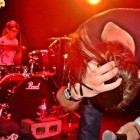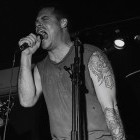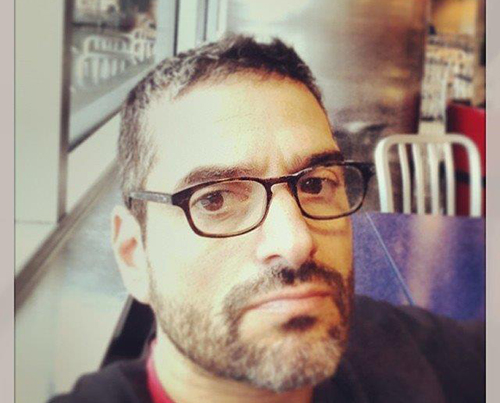
Music has been at the center of Mike Gitter's life since he was a little kid growing up in Massachusetts. First making his mark as the writer behind the influential xXx hardcore zine in the '80s, Gitter has also released records as a musician, and for the past three decades he's worked behind the scenes as an A&R executive at such labels as Atlantic Records, Roadrunner Records, and Razor & Tie.
Gitter recently took over as Vice President of A&R at Century Media Records, the label behind bands like At the Gates, In This Moment, and Napalm Death. I recently chatted with the music industry veteran for the folks at CreativeLive to cover Gitter's career as an A&R executive (read it here), but during our conversation, we covered a ton of time on his earlier years in the Boston hardcore scene. Below is that portion of the interview that hasn't been run, until now.
When and where were you born and raised?
I was born on February 12, 1966, in Lynn, Massachusetts, a northern suburb of Boston. It's a place known to most aficionados of hardcore as the town that gave the world SS Decontrol. I was a relatively happy, well fed, upper-middle class male, but the fire burned within [laughs]! I grew up in Marblehead, Massachussets which is slightly up the coast from Salem. You know that [Dream Academy] song "Life in a Northern Town"? That kinda vibe. I went back recently and realized how beautiful a place it really is. It's actually a town over from Salem, which most of the world knows for its witch trials and Rob Zombie's Lords of Salem.
We lived in the "Golden Ghetto": home to Marblehead's more Jewish-leaning populace, since Marblehead is a very old Yankee town. It's a very historically rich place, and at least 400 years old. At one time, it was a fishing province that also had its impact on the early Boston hardcore scene. People like Jake Phelps, now editor at Thrasher, Andy Strachan from DYS, and Tony Perez, who would go on to play in Last Rights, all hail from there.
My parents are salespeople. They currently sell high-end teas. They were great. There was never any real pressure to follow a defined career path from them. Just to do something fulfilling and pay the bills, which I've largely been lucky enough to do. My folks were very supportive of me when I started charting out a career path, and they "got it" when I started rolling home at one or two in the morning from being in Western Mass or Providence, Rhode Island seeing shows. As long as my grades were fine and I wasn't in trouble, it was all good.
What kind of music did you first gravitate towards when you were a kid?
Well, as a kid, I was obsessed with comics, sci-fi, and fantasy books and movies. Frank Frazetta, Conan the Barbarian, Space 1999, Planet of the Apes, Logan's Run, the real apocalyptic pre-Star Wars kinda stuff. Once I discovered music it became another means of escapism. For me, the louder and larger than life, the better. When I first heard Robert Plant singing about Middle Earth on "The Battle of Evermore," or discovered The Who's Tommy, it completely played on my imagination. Incidentally, when I first bought the soundtrack to Ken Russell's movie version of Tommy, it took me a while to realize Oliver Reed and Anne Margaret weren't in The Who! I kinda bought the wrong record, but it still ruled.
Keep in mind, this was the mid-'70s: Alice Cooper and KISS had comics. Devo was featured in early issues of Heavy Metal magazine. Damn! Heavy Metal magazine! I still fiend for old Richard Corben airbrush artwork. Moebius! Druillet! At the time, David Bowie was singing about a marooned astronaut named Major Tom. Gary Numan was making records that lyrically grabbed from Phillip K. Dick. It was a big next step from my folks' Beatles and Jim Croce 8-Tracks!
I definitely discovered stuff through hanging out with older kids in my neighborhood, but Boston and the surrounding towns had both a rich music scene and tons of great radio stations. In the late '70s and early '80s, FM radio was coming into its own and there were a lot of great stations in the area: WBCN, WLYN (which became WFNX), and tons and tons of great college stations that started permeating my daily listening. That's how I discovered everything from local heroes like Aerosmith and Boston to hardcore. Salem State College had a great radio station, WMWM, which was literally down the street from where I grew up, and they played a ton of new, cutting edge music—which at the time, was hardcore.
SEE ALSO: 2015 interview with Chaka Malik (Burn, Orange 9mm)
When did you start to realize that this "music thing" was becoming an obsession? Was there a specific band that sparked that for you, or was it more of a musical movement that did it?
Hardcore changed everything. And it changed everything for me when I realized it was happening on a local and very personal level. Getting the Dead Kennedys' Fresh Fruit for Rotting Vegetables and Black Flag's Damaged were one thing, but when the This is Boston Not L.A. compilation came out, as well as SS Decontrol's The Kids Will Have Their Say, all of a sudden, this movement was more than within my grasp. It was in my back yard and it spoke to me in a manner that no music had to that point.
When I think of the area of the country you grew up in, Al Quint is the first guy that comes to mind.
Al is like my big brother in a lot of ways. He and I recently tried to figure out exactly when we met and we couldn't pin it down, but it had to be in late 1982 or early 1983. He's literally from one town over on the North Shore of Boston. We're both cranky Jewish kids from similar backgrounds. Al's a few years older than me but it was inevitable we'd become tight bros from way back! Al and I hung hard back in the day! We were definitely the Boston fanzine mafia! Full disclosure: had there been no Suburban Punk (Al's zine that he later christened Suburban Voice) then there would have been no xXx. We both ended up going in different directions and even had a bit of healthy competition between our zines, but I still have tons of love for the great Mr. Quint. You can't deny his contribution to hardcore America or fanzines in general.
When did you start doing the xXx zine and what inspired you to do it in the first place?
By 1983, fanzines were commonplace: connecting the underground in a way that the blogosphere and subreddits do today. I simply started a fanzine out of the same anxiousness, anxiety, and hyperactivity that makes one pick up a guitar and be part of it all. That was the "back to basics" promise of punk, hardcore, or anything we've come to tag "D.I.Y.": Do It Yourself. That was the mission, if you chose to accept it. I did, and there's been no turning back ever since. I was definitely influenced by a few of the classics of the day: Boston's own Forced Exposure, Glen E. Friedman's legendary photo zine, My Rules, and, of course, my pal Al Quint's very own Suburban Punk.
With a Dead Kennedys show in Waltham, Massachusetts on June 6, I took three interviews originally done for an unfinished fourth issue of a pre-xXx fanzine called Suburban Mucus: an interview with The Proletariat, one with then fledgling punkers Psycho, and another with L.A.'s Legal Weapon, surrounded them with mostly laudatory reviews of shows I had seen over the preceding few months—including a legendary Angry Samoans/SSD/DYS bill at The Channel in Boston—as well as a clutch of record reviews including The Necros' Conquest for Death and Scream's Still Screaming, and voila! xXx #1 was born. Funnily enough, one of the first people to buy a copy of xXx from me at that DK's gig was none other than Haverhill native, Rob Zombie! Small world. Just a few years later, Rob's band, White Zombie, would advertise their Psycho Head Blowout EP in xXx!
I know you're releasing a xXx anthology that collects all of the issues.
It's actually not a complete collection as much as a really well annotated "greatest hits" of xXx's 20 issue run, with additional interviews, pictures, flyers, quotes... it's coming out through Boston's Bridge Nine Records towards the end of 2015. It's been a real passion project for myself and Bridge Nine owner Chris Wrenn since we dug into it sometime in 2013. I can't say enough amazing things about Chris. The guy is one of the hardest working and most dedicated people I've ever worked with.
While working on the book, I've been able to go back and re-interview or get quotes from people I interviewed for xXx when it was active back in 1983 - 1988. People like Henry Rollins, Dan O' Mahoney, and Vic Bondi from Articles of Faith gave me quotes; and there's some very in-depth interviews with the likes of Ian MacKaye, Roger Miret, Keith Morris, Choke from Slapshot, as well as very rare interviews with guys like Rick Jones from Jerry's Kids or members of Void. Some of these people haven't done an interview in upwards of 20 years. By the time it's done, there will be somewhere around 100 additional voices rounding the entire book out. It's been a great time putting it all together and reconnected me with a lot of great old friends and acquaintances.
If that ain't enough... this is where this answer sounds like a K-Tel Records ad... there's a compilation included with the book that brings together about 12 currently active bands including Strife, Trial, Gallows, Shai Hulud, The Shrine, and a handful of others covering songs from 1983 - 1988: the years xXx was active. Like I said, this project has been a long time coming and a shitload of fun to put together.
SEE ALSO: The New Wave of British Hardcore
Going back to the '80s, you played in a band called Apology that you've been very dismissive of. It can't be all that bad, right?
Actually, I played in a band with Al Quint before that! It was called No System and was a typically awful stab at high school hardcore glory. I lasted about two shows before Al came to his senses and booted me. He moved from bass to lead vocals and overall it stepped up a bit. Al ended up recording some of his songs from that band with guys from the very underrated PTL Klub, which was released as a 7" years later entitled Dead Bands Tell No Tales. There's only one recorded appearance of me with No System: on an Ax/ction Records tape comp with a song called "S.A.T.," a fervent protest against the injustice of the Scholastic Aptitude Test. Suburban rebellion, indeed! "You're not a person/You're only a score/Condition yourself to try and do more!" Classic!
Apology was a band I formed with a guy who actually knew nothing about the music we were purportedly making! I had been touring with Uniform Choice in 1987 and we did a lot of shows with the proto-Chain of Strength band, Justice League. Justice League's touring guitarist, Matt Baker, was moving to Boston to attend the Berklee College of Music and interested in forming a band. I naturally assumed, coming from Justice League, that Matt's interests were more along the lines of mine... melodic hardcore of the Dag Nasty/7 Seconds variety. Well, as it turned out, Matt was actually the kid from down the street who could play guitar reasonably well, who was simply there when Justice League needed a guy to go on tour! His first real immersion in punk and hardcore was that very tour! He was coming more from a Beatles/Replacements/classic rock direction, which was definitely not what I had in mind.
The EP we did on Uniform Choice's Wishing Well label is spotty at best. Probably not as terrible as I usually say it is. It was produced by the extremely talented Lou Giordano, who recorded some of the classic Boston hardcore records—including bands like SSD, Siege, Jerry's Kids, The Proletariat. Vic Bondi from Articles of Faith co-produced and helped shape it somewhat. Vic was living in Boston at the time, teaching at Boston University, where I went to college, and we had become friends. It's not a hardcore or punk record whatsoever. There's a couple of good songs: the title track, "Pass You By," in particular, but most of it is largely forgettable. Live, we were pretty uneven, to be kind. I'm really not the best singer and would have been suited to something a lot more straight down the line hardcore. There were a couple talented people in that band. Matt, certainly, could play. The bassist, Jeff Goddard, actually went on to play in a great Boston indie rock band called Karate, and before that, the very underrated Jones Very, with Vic Bondi on guitar and vocals.
Did you play in any other bands? If so, please educate me.
Well, when Apology (thankfully) called it quits, our roadie Patrick Mahoney and I wanted to do something more straightforwardly hardcore, à la Can I Say-era Dag Nasty or Swiz. That became the short-lived band, Grin. It's probably the high point of my musical career. We did a 7" on a small Italian label called Break Even Point that Lou Giordano recorded, and we got to play shows with the likes of All, Kingface, Verbal Assault, and if memory serves, even opened for the Circle Jerks at one point! Had we continued, I think it would have become a decent band. When we decided to call it quits, it was still a bit half-baked. Patrick went on to become the final touring guitarist with Uniform Choice, and some of the other members, including Patrick, would drift in and out of Vic Bondi's bands—including Jones Very and Alloy. Patrick and I are still in touch and have actually worked together at different points in music merchandising.
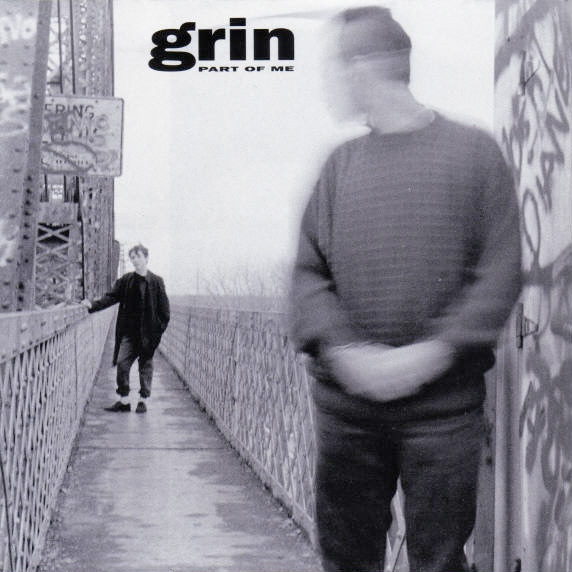
From that era of hardcore, who were some bands you thought deserved some more attention and why?
There were hundreds, probably thousands of unsung heroes of hardcore. Way too many to mention here. As far as some of the bands that never completely got the credit due?
Mmm... Jerry's Kids! Not only is Is This My World? probably the best record to come out of the Boston area in the mid-'80s, but they were easily one of the best, most focused and creative bands to come out of hardcore, period, end! The sheer intensity of their playing and performance is really second to none. Siege was another great "What the fuck?" kinda prospect. They played maybe 10 shows total but helped change the landscape of extreme music. Another great band was The Outpatients, from Western Mass, who fused hardcore with a Motörhead-like attack in the early '80s. Boston's Sorry. You also had bands that did well at the time that have faded from the annals of history a bit. Government Issue or Die Kreuzen are two prime examples of bands that attempted to expand the vocabulary of punk that deserve more credit than they get.
What do you think were the biggest differences between Boston and New York hardcore?
Socio-economics to start with. The main players in Boston's early hardcore scene were largely suburbanites: guys from Lynn, Marblehead, Norwood, and Cape Cod; while New York's main players were from Queens, Brooklyn, Manhattan, New Jersey... largely much more urban areas that create larger than life personalities like Jimmy Gestapo, Vinnie Stigma, Paul Bearer... Not to say that Boston didn't have its hardcore superheroes: Choke, Al Lethal, Jake Phelps... but there's something about the New York guys that's very in step or out of step with their environment. Plus, the New York guys were a lot cooler, open, and more accepting of outsiders, where their Boston scene counterparts were a bit more insular and proud.
Musically, the New York bands were late bloomers, but what came out of NYHC has endured and been completely influential in a very large way. Whether it be the breakdowns of the Bad Brains (who are as much a New York band as a DC band) and Cro-Mags; or the metallic leanings of Leeway and Crumbsuckers; or Youth of Today espousing straight edge, Krishna, and veganism to a scene that was indifferent at the time, the New York scene that blossomed after 1985 made a very rare and resounding impact.
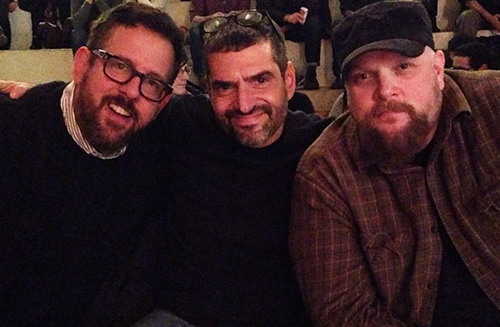
Boston was important in its own way with its very martial, aggressive approach à la the "crew" bands like SSD, DYS, and Negative FX. There were also some truly great and unique "outsider" bands including Jerry's Kids, The Proletariat, The Freeze, and the mighty Siege. Still, something about that scene didn't completely resonate in the same way as New York did.
That said, the best of the New York bands continued to musically build on the foundation of bands from places like DC, Boston, or Detroit. If it wasn't for the pioneering of bands like Minor Threat, Void, or SSD, you wouldn't get an Agnostic Front or even a Rorschach! Perhaps it has to do with the lack of a flagship band like Agnostic Front being there to lead the way through the ebb and flow of hardcore history. That said, a band like Agnostic Front wasn't merely important to NYHC, they were important to hardcore as a whole. In truth, Boston never had that ultra-dependable "lighthouse" kind of band.

